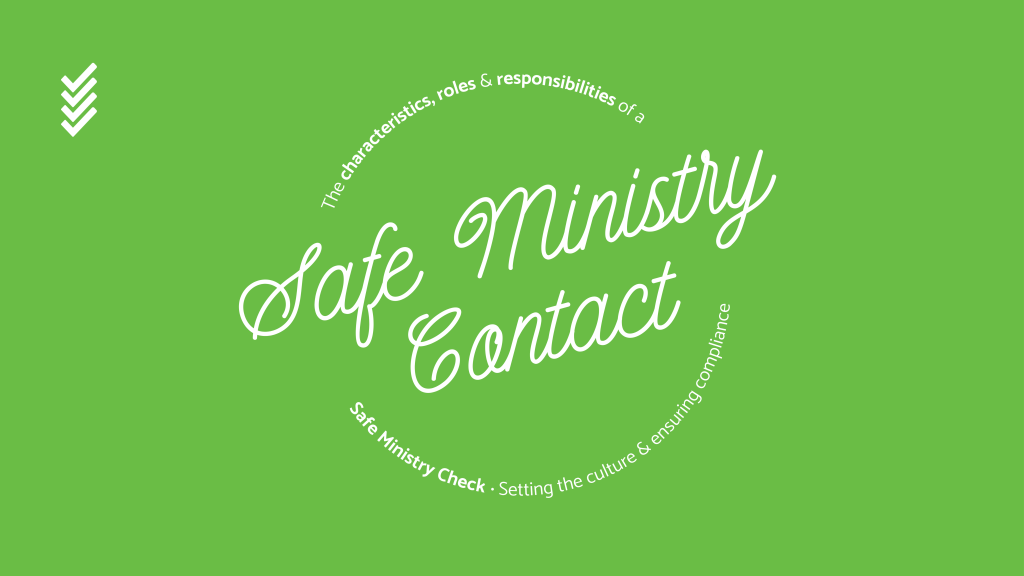In the church community, Safe Ministry Contacts hold a vital position in encouraging and maintaining a culture of safe ministry. They are the go-to individuals for concerns related to safeguarding and play a crucial role in responding to reports of abuse and concerns. Here’s an overview of the primary characteristics, roles, and responsibilities of Safe Ministry Contacts.
Primary Characteristics
- Trusted & Above Reproach in Character: Safe Ministry Contacts must be individuals of impeccable character, known for their integrity and trustworthiness.
- Empathy & Availability: They must exhibit a high degree of empathy, understanding the sensitive nature of the issues they handle. Being available and approachable ensures that individuals feel safe, comfortable, supported, and confident in sharing their concerns or experiences of abuse.
- Discretion: Maintaining confidentiality is paramount. Safe Ministry Contacts must not share any information disclosed to them outside of the appropriate response channels, such as police or reporting institutions. This protects the privacy and dignity of all involved.
“So, we’ve found
some people who fit the bill.
What now?”
Other Points to Note
- Ensuring Multiple Contacts: There should be a minimum of two Safe Ministry Contacts to ensure transparency, accountability, and provide an alternative person to report to if the concern is about another Safe Ministry Contact. This structure is essential for building trust within the community.
- Neutrality & Separation from Staff: It’s crucial to have a Safe Ministry Contact who is neutral and has a degree of separation from the staff team. This ensures that any concerns raised about a staff member are heard without bias, providing assurance that grievances will be addressed fairly.
- Independent Contacts: Safe Ministry Contacts should not be too closely connected, such as being a married couple, to avoid conflicts of interest. This ensures that concerns raised about one contact can be addressed without bias by the other contact.
“We now know who to ask,
but what is their role?”
Key Roles and Responsibilities
Staying Informed:
- Safe Ministry Contacts must keep up-to-date with their state’s reporting guidelines to ensure concerns are followed up in line with legal requirements. This ensures that the response to any report of abuse or concern is legally compliant and thorough.
Responding Promptly & Appropriately:
- Safe Ministry Contacts must respond quickly to concerns and reports of abuse, following the organisation’s Incident Management Process Plan. This involves assessing the situation, determining the appropriate steps, and ensuring that actions are taken swiftly to address the issue.
Championing Safeguarding:
- Safe Ministry Contacts need to be passionate about safeguarding, actively promoting and championing it within their church or ministry organisation. They should work to support a culture of safety, ensuring that safeguarding principles are understood and practised by all members.
Confidentiality & Appropriate Reporting:
- They must handle all information with discretion, sharing details only with those who need to know, such as law enforcement or relevant authorities. This ensures that the information is used appropriately and that the privacy of those involved is protected.
Support and Guidance:
- Providing support and guidance to individuals who report concerns is a critical part of their role. This involves listening empathetically, offering reassurance, and guiding them through the reporting process. Safe Ministry Contacts should make sure that individuals know what to expect and feel supported throughout the process.
Communication and Reporting:
- Clear and effective communication is essential. Safe Ministry Contacts must ensure that all incidents are reported accurately and that the necessary information is conveyed to the appropriate authorities. They should also communicate the importance of safeguarding to all members of the organisation.
By responding promptly to concerns, maintaining confidentiality, and championing safeguarding, these individuals play a critical role in creating a safe and supportive environment within their church or ministry organisation. Their dedication and integrity help to ensure that all members, especially the vulnerable, are protected and cared for.

